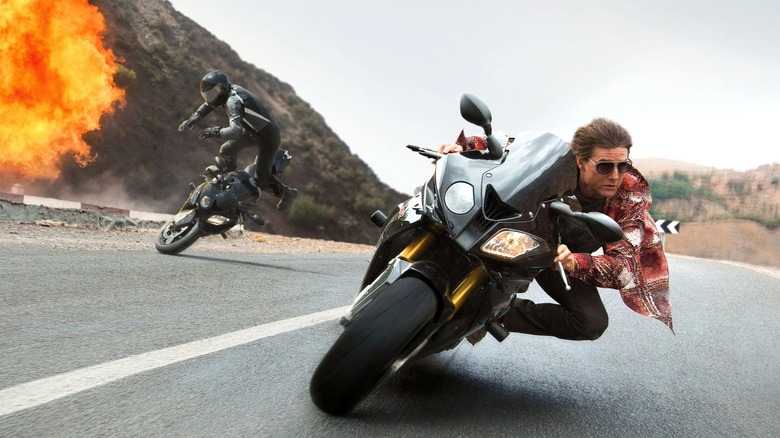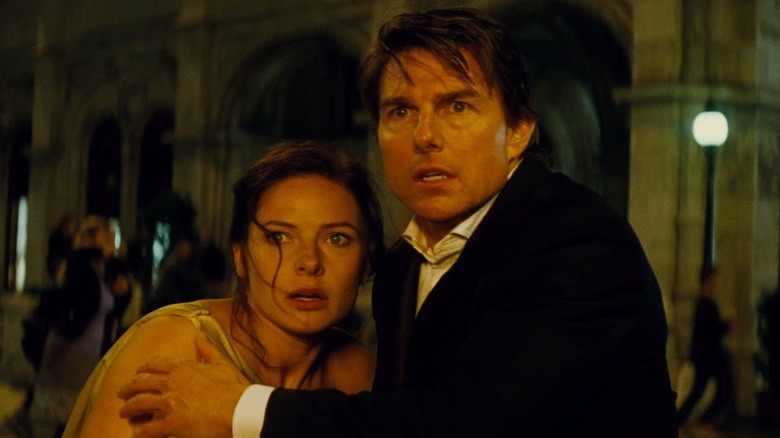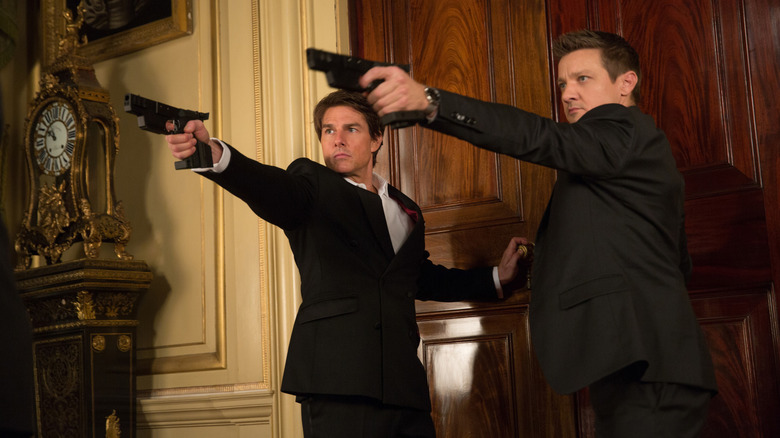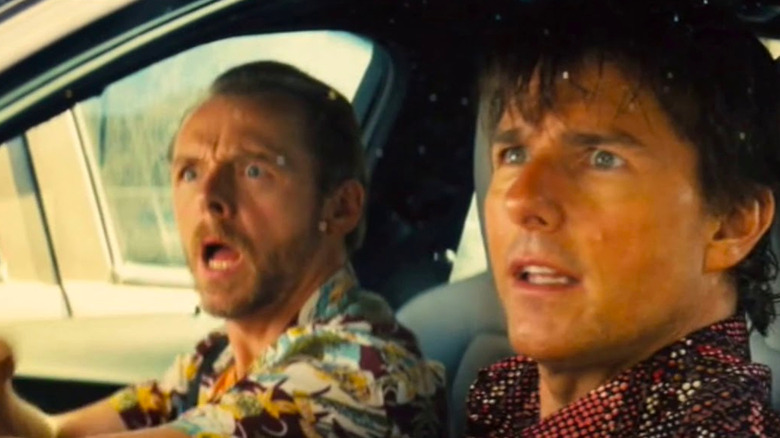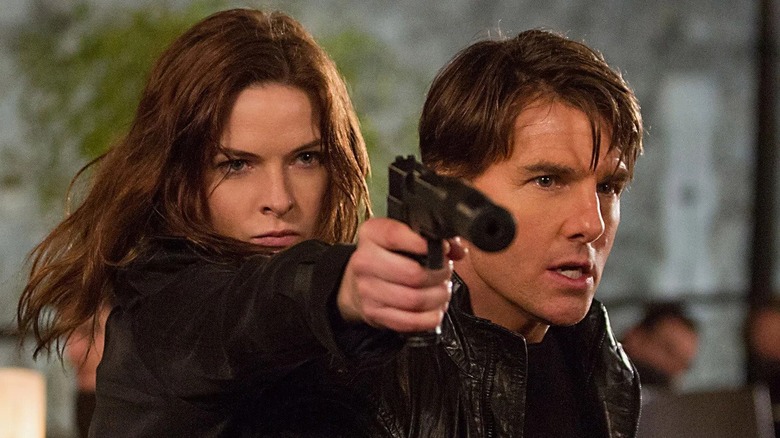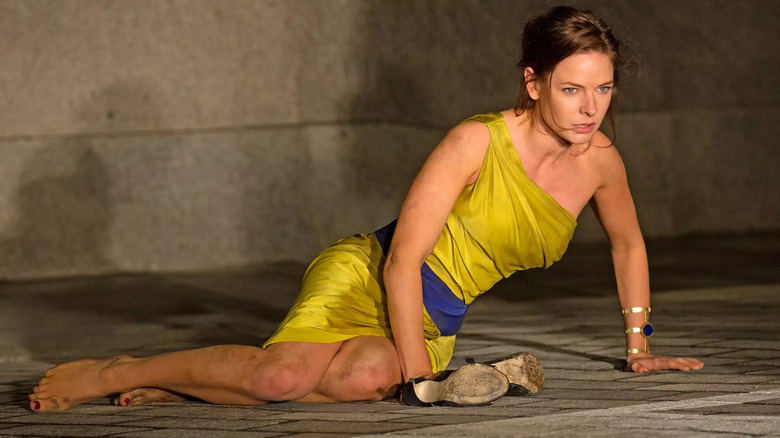How Mission: Impossible - Rogue Nation Created A New Chapter For Ethan Hunt - And Tom Cruise
(Welcome back to Man on a Mission, a series where we revisit the films of the "Mission: Impossible" franchise as we sprint toward the release of the seventh film next month.)
As the "Mission: Impossible" film series closed out its second decade, there were a few recognizable hallmarks that ran through each entry. Ethan Hunt (Tom Cruise, natch) would always be the most determined and driven agent within the Impossible Mission Force, always willing to place his own life and safety over that of the millions upon millions of people who depended on his heroism without even realizing he was the one who could stop them from certain doom.
Ethan would be joined by only a couple of fortunate returning players, such as Luther Stickell (Ving Rhames) and Benji Dunn (Simon Pegg). There would always be death-defying stunts, too. But it took nearly twenty years for a "Mission: Impossible" film to crack the code of having a female character with weight and dimension. Ethan Hunt has always been a compelling character because Tom Cruise is a magnetic screen presence. It just took until the 2015 film "Mission: Impossible – Rogue Nation" for Ethan to meet someone as talented as he is. Enter Ilsa Faust.
Of course, before Ethan meets Ilsa (Rebecca Ferguson), there's at least one death-defying stunt to display. In the run-up to "Rogue Nation," one truly arresting stunt had been shared and marketed half to death, in which Ethan Hunt would literally hang off the side of a plane while it was in flight ... which of course meant that Tom Cruise was going to the lengths of hanging off the side of a plane to entertain audiences around the world. The movie does not waste any time getting to that stunt, which serves as the cold open. The details of why Ethan has to resort to this action are minimal, as much as where he was before the stunt begins. (The rest of his team is trying to stop black-market operatives from stealing nerve gas, and when they're unable to stop the plane from departing, Ethan appears basically out of nowhere to do it his way.)
An anti-IMF
We soon learn that this particular operation is just a piece of a very large and dangerous puzzle: Ethan believes that there is an anti-IMF of sorts called the Syndicate, a terrorist organization capable of bringing down the current world order and hell-bent on destroying things from the inside out. As he learns upon visiting a London record shop that doubles as an IMF headquarters, he's right: the Syndicate is real and close. He only learns this via the classic recording meant to inform him of his mission, except that the Syndicate is now in charge of those recordings. (It's a nice touch that co-writer/director Christopher McQuarrie had Pixar animator Teddy Newton do the voice for this recording, as Newton served in a similar role in the 2011 entry "Mission: Impossible – Ghost Protocol.")
Ethan comes briefly face to face with the man behind the Syndicate, an ex-MI6 agent named Solomon Lane (Sean Harris), before being captured by Lane's men and nearly tortured to death. It's only through the assistance of the enigmatic Ilsa that Ethan escapes. (After watching her smoothly dispatch a number of the men who Ethan presumes she was working with, he looks at her, almost dazed, and asks, "... do we know each other?" One of many wonderfully funny moments in this film, in part because McQuarrie seems to lock into how surprisingly hilarious Cruise can be with just a few brief words of dialogue.)
Ethan's escape, though, couldn't come at a worse time for the IMF. Though the organization has always had its problems — consider the running gag in "Ghost Protocol" that the stripped-down team is barely able to use any of its various gadgets, which continually break down — it's at death's door thanks to the protestations of CIA Director Alan Hunley (Alec Baldwin), who's ready to dismantle the IMF and its dangerous tactics in spite of defenses from William Brandt (Jeremy Renner). Hunley wins, at least temporarily, and Ethan vanishes while Brandt and Benji are brought into soulless work at the CIA.
The living manifestation of destiny
Ethan Hunt, as we know by now, does not rest on his laurels. After fooling CIA operatives into thinking they're close to grabbing him (as a fugitive) in Havana, Ethan enlists Benji in aiding him against the Syndicate by sending the ex-techie to Vienna. (This comes after Benji is subjected to a weekly lie-detector test by Hunley to see if our intrepid hero has reached out to him.) The ensuing sequence — as Ethan and Benji realize that the Austrian Chancellor is in attendance at a Vienna State Opera performance, and Lane's people are there to assassinate him — is the first time in a while that the "Mission: Impossible" franchise has recalled the best of Alfred Hitchcock's films, balancing hand-to-hand action with genuine suspense. Though the sequence isn't silent — we hear the strains of operatic notes from "Turandot" as Ethan, Benji, and eventually Ilsa all attempt in their own way to stop the Chancellor from being killed — the way in which our heroes have to operate without disrupting the events around them recall the CIA break-in sequence from the first film in the series.
It at least becomes clearer from this sequence that Ilsa not only has her heart in the right place, but she's not a true member of the Syndicate at all — she's under deep cover as part of a mission from her MI6 chief (Simon McBurney), with the intent of eventually coming in from the cold. But their joint mission fails, as the Austrian Chancellor is blown up in a car bomb after the opera performance, and Ethan is now framed as the man behind the murder. It's fitting that Ethan and Benji's next phase of the mission takes them to Casablanca, where they and Ilsa (again, a nice touch; think of the character's first name and the 1942 film bearing the name of that Moroccan city) join forces to find a list of all Syndicate operatives' names ... which means Ethan must hold his breath underwater for minutes on end to ensure Benji can access the list without being caught. If there is any potential weak point in the film, it's this one.
While Cruise did indeed hold his breath for (apparently) six straight minutes, the scene in which he goes underwater to dismantle the security system that would catch Benji as a phony is a rare moment that feels as if it's too aided by special effects. No doubt there are many practical elements at play (and Cruise does genuinely look like he's underwater for a while), but the free movement of the camera projects a sense of such heightened reality as to be computer-generated.
'You're asking me that now?'
Perhaps part of what makes this centerpiece feel a bit less exciting is that a propulsive car chase through Casablanca immediately afterwards is a hell of a lot more thrilling. Ilsa comes to Ethan's rescue — suggesting that, much as the Syndicate mirrors the IMF, she mirrors Ethan as a physical and emotional equal — and brings him back from the brink of death. Though Benji was successful in getting the list of Syndicate names, Ilsa needs it for her own purposes and steals it, leading to the chase sequence. (At the same time, Brandt and Luther arrive in Casablanca in the hopes of helping Ethan and clearing his name with Hunley.)
The sequence is signature "Mission: Impossible," blending fast-paced thrills with effective doses of humor. (Ethan — again, just minutes removed from having been all but clinically dead — is dazed to begin with as a driver, and his passenger Benji counterbalances this with innate terror. When Ethan asks, midway through the chase, if Benji has put on his seat belt, Pegg's delivery of the line "You're asking me that now?" is still pretty hilarious.)
The chase concludes as Ethan, having exited the totaled vehicle, hops onto a motorcycle to stop Ilsa but is unable to grab her before she escapes with the list in tow. That specific mission may be unsuccessful, but the chase itself goes a long way to proving that McQuarrie — who we'll be discussing again in the next installment of this series — was as capable an action filmmaker as Brad Bird, J.J. Abrams, John Woo, or Brian de Palma.
A man in a box
But McQuarrie first became known as the Oscar-winning screenwriter of "The Usual Suspects," and so it's little surprise that the final act of "Rogue Nation" sports a writerly tidiness. Where the film opened with Ethan being placed in a box by the murderous Solomon Lane, the film concludes with the reverse. Back in England, the IMF team breaks into a tony affair featuring visitors such as the British Prime Minister (Tom Hollander) and is able to prove to Hunley that even if Ethan Hunt is "the living manifestation of destiny," our hero is right about the Syndicate: it's real, and the reason why the MI6 Chief has been so hellbent on having Ilsa destroy all evidence of it (including that list of names) is that it was his idea, and only went pear-shaped when Lane went rogue.
Where "Ghost Protocol" tried to have a big-deal action sequence in its climax, "Rogue Nation" feels a little lower stakes, in that the existing tension is less world-ending-terror and more interpersonal. Lane is an unnerving villain because of how little we know of him, and how pent-up his rage appears to be, but when he speaks through an abducted Benji (who's strapped to some deadly dynamite) to taunt Ethan, it's a rare time in the franchise when lives that matter directly to Ethan feel genuinely on the line.
Of course, Ethan is able to rescue Benji and take down Lane, by goading the latter into a trap that ensures the aforementioned: that Lane will be trapped in a box instead. As effective as the finale is, it does highlight one of the oddest limitations of the "Mission: Impossible" franchise — that its villains rarely live up to the hype, in a way. To this point in the series, the best villain remains Owen Davian, in no small part because Philip Seymour Hoffman was such a titanic actor that he couldn't help but make the underwritten arms dealer stand out. Sean Harris is disturbing enough as Solomon Lane, but McQuarrie's best choice in creating the character was hiring an actor with such a mysterious face that's so effective at becoming discomfiting with the right glare or glance. While Lane would become a truly notable villain for surviving the events of this film (he's the first to this point to make it through), it's still somewhat lacking for his character since we still know so little about him.
True continuity between entries
"Rogue Nation" stands out not just because of Ferguson's stellar performance as Ilsa, or Cruise's continued efforts to endanger his body at the risk of entertaining worldwide audiences. With Christopher McQuarrie at the helm, we have here the first sense of true continuity between entries. Some of that continuity existed in "Ghost Protocol," with Simon Pegg serving as the first returning player not named Ving Rhames, as well as the continued presence of Ethan's now ex-wife Julia (Michelle Monaghan).
"Rogue Nation" ends with so many characters ensconced with the IMF or still floating in the proverbial wind to connect again, from Ilsa to Luther and Benji and even now Alan Hunley, who's so won over by Hunt that he becomes the new IMF Secretary, that job title serving as the capper to the overall film. If "Rogue Nation" left any strands untied, it was in the sense of the villain not quite being as memorable as hoped.
That would change with the next entry.
Next Time: Ethan Hunt has to brace for a "Fallout".
